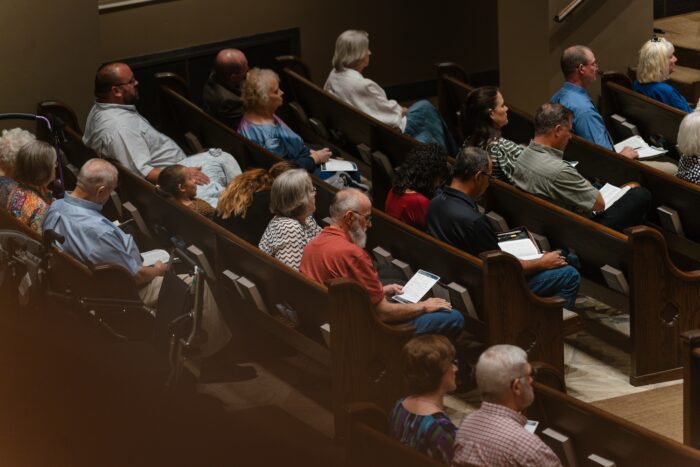From time to time, I like to ask my fellow worship ministers: Why do people come to church? Why do your church members gather for worship each week?
I get all kinds of answers. Some, they admit, likely come out of habit, or for the social interaction, or to earn moral points with their neighbors. If you’re a “good person,” you go to church, right?
I’d like to suggest that the Bible offers us five purposes for worship gatherings. You might add additional ones, but I believe at least these five should both motivate and shape our worship services. Moreover, I believe that if we can keep these five purposes as our priorities, then many of the conflicts that arise around our worship ministries will begin to melt away.
Proclamation
In English, “to proclaim” something means to herald it, to announce it publicly. Picture a king sending out his heralds with trumpets and fanfare. In Scripture, we see the idea of proclamation associated with a very specific announcement. The book of Acts describes Paul as “proclaiming the kingdom of God and teaching about the Lord Jesus Christ” (Acts 28:31). In Mark, John the Baptist “came baptizing in the wilderness and proclaiming a baptism of repentance for the forgiveness of sins” (Mark 1:4). Likewise, Jesus went through Galilee “proclaiming the good news of God” (Mark 1:14-15).
In each of these cases, it is specifically the Gospel which is proclaimed: the Good News of Christ’s atoning death, burial, resurrection, and imminent return. This was the purpose of the proclaiming work of Paul, John, and Jesus, and it remains a core purpose of our worship gatherings. Each time we gather, the public declaration of this Gospel should be a priority.
Adoration
Adoration simply means praise, boasting – not about ourselves, but about our Great God. Scripture is full of adoring expressions, exclamations like Hallelujah! Praise the Lord!, and the Book of Hebrews reminds us we should “continually offer up to God a sacrifice of praise, that is, the fruit of lips that confess his name” (Heb. 13:15). That name is, of course, the name of Jesus Christ, the Son of God, the second person of the Trinity. If proclamation is about announcing the amazing work of Jesus, then adoration is about praising Him for that work. Our corporate gatherings should always be an opportunity for us to express our love, our gratitude, and our praise for Christ’s work on the cross.
Participation
Perhaps you have experienced worship services where it seemed the congregation only showed up to observe the performance. But I’d like to take us back to a Greek word that speaks to the need for participation in worship gatherings: koinonia. The English word for this idea would be “fellowship,” and we Baptists would likely associate it with after-church potlucks and cookouts. The biblical idea of fellowship, though, is about more than a buffet line – it’s about the experience of communing together, sharing together, taking part in something meaningful with other human beings.
This is what Paul is talking about in 1 Corinthians 10, when he addresses the Corinthian church: “The cup of blessing that we bless, is it not a sharing in the blood of Christ? The bread that we break, is it not a sharing in the body of Christ?” (1 Cor. 10:16). He’s talking there about the Lord’s Supper. Notice that he says, “the cup we bless,” and “the bread we break.” On a similar note, Jesus taught us to pray, “Our Father in heaven” (Matt. 6:9), and Ephesians 5:19 tells us our corporate worship should involve “speaking to one another in psalms, hymns, and spiritual songs.” When we gather for worship—be it in prayer, in music, or through the ordinances—our time together should highlight the togetherness of our faith. It should serve as a tangible, bodily reminder that we are not alone in the Christian life, but are pursuing Christ alongside other brothers and sisters in the Lord.
Edification
Edification is related to the idea of teaching and learning, but also to our English word “edifice,” or “building.” When Jesus speaks about building our house upon the rock instead of upon sand, He’s using the Greek word for edification (Matt. 7:24-27). To build a house, you strengthen it, reinforce it, so that it doesn’t crash to pieces when a storm comes. This is what Paul is talking about when he says that different believers have been given different roles in the church, all in order “to equip the saints for the work of ministry, to build up the body of Christ, until we all reach unity in the faith and in the knowledge of God’s Son” (Eph. 4:10-14). Christian worship gatherings should indeed be times of teaching and learning, of gaining knowledge of the tenets of Scripture. But that learning should not puff us up or make us proud. Rather, it should edify us, build us up together, increasing our ability to love one another and labor together for the cause of the Gospel.
Anticipation
As a musician, I’m well-acquainted with the idea of a rehearsal. The point of a rehearsal is to prepare for a future performance, to be ready and equipped for a choir concert or Christmas cantata. It’s also the time when we “build hype” and raise our expectations and excitement for what’s to come. So, if our church services are “rehearsals,” then the Book of Revelation is the coming “performance.”
Revelation 5 tells us that, when Christ comes again, all heaven and earth will join together in adoration of God. “[C]ountless thousands, plus thousands of thousands” of angels will cry out, “Worthy is the Lamb!” In addition, we will hear “every creature in heaven, on earth, under the earth, on the sea, and everything in them say, Blessing and honor and glory and power be to the one seated on the throne, and to the Lamb, forever and ever!” (Rev. 5:11-13).
When we get together with our local church, it should make us long for that heavenly worship. It should make us eagerly await it, anticipate it with joy. Worship gatherings are a preview of heaven, and the experience should make us long all the more for that day.
All Together Now
But of course, we are imperfect people. We all bring a wide variety of musical opinions and stylistic preferences to church each Sunday. And admittedly, those differences can cause conflict, and rob our gatherings of the unity and fellowship they’re meant to foster. But, if we can keep these five priorities front-and-center in our corporate worship, then we’ll be far better equipped to navigate such issues. Consider how these five pieces fit together.
First and foremost, God initiates the rhythm of worship by revealing Himself to us through His Word. Everything we do in worship is a response to God’s gift of revelation. So, in a church service, that response takes the form of proclamation. Our pastors, preachers, worship leaders, and lay ministers proclaim the Gospel to the congregation through song, Scripture reading, preaching, and so forth. The congregation then has the opportunity to respond to that proclamation through adoration, often through song, but also through corporate prayer, confession, or even moments of silence. However, that adoration does not happen in a vacuum. Each member adoringly responds to God by participating in the liturgical rhythm of the service, being edified along with the rest of the local body in these expressions of spiritual unity and in this increase in wisdom that comes from hearing the Word proclaimed. This proclamation has an “inward” dimension, addressing the Body of Christ, in that it prompts us to anticipate Christ’s coming. It also has an “outward” dimension, as it becomes a message of repentance and hope to the unbelievers who encounter our worship gatherings.
As worship leaders, it is our responsibility to keep these priorities continuously before our congregations. It is our job to make sure these principles are the lens through which our congregants see their church services. Questions of which instruments to use and which music styles to employ are only meaningful in the broader context of whether or not those temporary tools facilitate these eternal purposes.
When younger believers ask, “Why are we singing this old song?,” our answer need not be, “Well, because the old folks like it.” Rather, we can confidently show them how an old song beautifully and clearly proclaims the Gospel message. In the same way, when older congregants wonder, “Why are we singing this new song?”, we can explain that it allows us to honestly express our adoration for God’s work, and our anticipation of Christ’s coming.
Again, you and your church might find additional priorities to highlight. Or, you might find different vocabulary to express these same ideas. Whatever the specifics of your communication style or cultural context, I hope that these five purposes can provide you a biblical framework within which to structure your worship services and navigate conflicts surrounding corporate worship.








